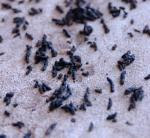Thus spake Jan Eliasson, Deputy Secretary General of the United
Nations (and once-upon-a-time Diplomatic Advisor to Olof Palme, the Swedish
champion of Central American left-wing guerrillas and the dictator of Cuba,
among others) the other day, and his every sentence was a trove of gems, dropped upon the
community of nations—no one more exceptional than any other, except maybe
members of the Non-Aligned
Movement—like so many nuggets of conciliatory guano from on high the
bat cave:
So this issue comes
up every now and then, and there are three dimensions to this issue that we
always should keep in mind, and sometimes they are difficult to
reconcile. The first one is the basic human rights of freedom of speech
and freedom of expression. The second one is the respect for the value
and beauty of this right, that provocations, a lack of respect towards others,
in a world where there is enough of contradictions, antagonism and even hatred,
that we should recognize that you have this gift given to us by the [Universal]
Declaration of Human Rights, but it also implies some type of responsibility to
use that in such a way that you don’t cause situations; which brings me to the
third point, namely, of course, always strong reactions, condemnations of the
violence, as a result of the provocation. So you have to have to keep in
mind, yes, this is the basis for, I hope, most of the countries in the world —
the freedom of speech, the freedom of expression, since this is in the
Universal Declaration — but that this also is a privilege that we have, which
in my view involves also the need for respect, the need to avoid provocations,
in a world where we have enough of contradictions and hatred; but that when you
respond to the provocations, and actually those who wanted to provoke had
succeeded with the violence and the results of the violence. So we need
to really make sure that we understand each other on all these three counts,
and there, there is a need for dialogue. We have the Alliance of Civilizations.
You have the fact that so many speeches dealt with this in a very deep
way was, in my view, also a way of saying to the other side, yes, you may think
that this is horrible to you, but if we infringe on the freedom of speech, we
have other problems, but yes, we understand you, that you were provoked, that
it was an absolutely unnecessary, stupid way of causing even more hatred among
you. And when you run on the streets and people are killed and buildings
are burned down, those who provoke have succeeded. We shouldn’t fall in
that trap of provocation, so that’s the line I think we’ll take. And the
more we talk about this in an open way on the basis of our values, then the
better it is.
 |
| Guano |
So, just to get this straight: The freedom of speech that
includes the right, oh, let’s say, for argument’s sake, to call the prophet of
Islam a defiler
of little girls, may derive from the Universal Declaration of Human Rights, or it may originate with Allah himself, or it may be given to us by the Alliance of Civilizations,
or it may come from an Archie comic; who’s to say? Certainly not a conflict-resolutionist and visionary of Peacebuilding
such as Mr. Eliasson. And anyway, what does it matter?
What does matter is that it’s a relative right, which may—no, which
must—be wrested away from the benighted rest of us who have never belonged to
the Non-Aligned Movement by fellow-travelers of the Allah-worshipers who
retain the privilege of defiling little girls (and boys)
according to their marvelously diverse religious customs.
